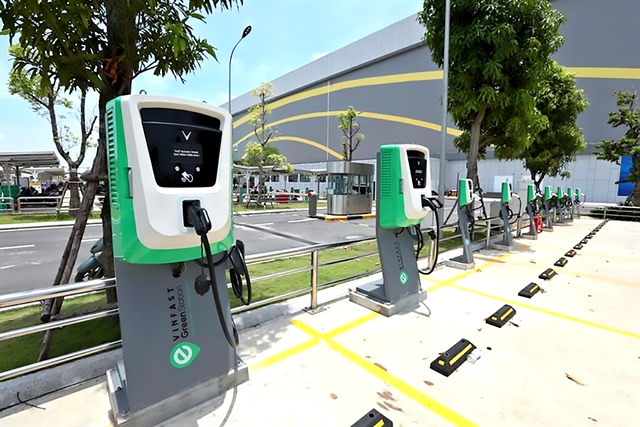 Society
Society

 |
| A VinFast charging station in HCM City. Việt Nam’s largest city plans to build a citywide EV charging network to support its green transport strategy. — VNA/VNS Photo |
HCM CITY — HCM City has unveiled an ambitious plan to develop a citywide electric vehicle (EV) charging infrastructure, including 19 large-scale charging stations and 3,000 smaller charging and battery-swap points, as part of its broader push to make the transport sector greener.
The initiative is part of a draft emissions control plan that aims to phase out fossil fuel-powered vehicles and transition to electric and other environmentally friendly alternatives.
By 2030, Việt Nam's largest city aims to fully convert its public bus fleet to electric or clean energy.
Over the next five years, more than 3,300 diesel or compressed natural gas (CNG) buses will be replaced, including over 2,200 buses on existing routes and about 1,100 for newly planned lines.
City authorities are also planning to convert more than 400,000 petrol-powered motorbikes used by ride-hailing and delivery drivers to electric models, according to a draft proposal by the HCM City Institute for Development Studies (HIDS).
The expected surge in EV adoption has made expanding the city’s charging infrastructure a pressing priority, experts said.
Currently, charging infrastructure remains limited, particularly for electric buses, which require high-capacity power and substantial space for charging facilities.
So far, only major operators such as VinBus and Phương Trang - Futa Bus Lines have installed large-scale charging systems for their electric fleets.
For private vehicles, public charging stations are largely funded by private firms.
The city currently has about 600 charging points for electric motorbikes operated by VinFast and 50 battery-swap stations managed by Selex.
To address infrastructure gaps, the city’s Public Transport Management Centre under the Department of Construction is working with relevant stakeholders to develop 19 dedicated charging stations for nearly 700 electric buses operating across 47 subsidised routes.
These routes are expected to launch in 2027, with a total investment of some VNĐ400 billion (US$15.6 million).
The stations will be strategically located in both central and outlying districts, including major hubs such as the Sài Gòn, Chợ Lớn, Văn Thánh, and Bình Thái bus terminals.
Most sites will be repurposed from existing depots or logistics yards, with allocated areas ranging from 50 to 800 square metres.
“The investment in EV charging stations will give businesses more confidence to join the electric bus network and support the city’s wider transition to greener transport,” said a representative of the Public Transport Management Centre.
In addition to the bus system, the city also plans to expand its public charging network for private EVs, taxis, and electric motorbikes.
By 2028, approximately 3,000 charging and battery-swap points are expected to be established at locations such as petrol stations, public parking lots, shopping centres, and parks.
The Department of Industry and Trade has pledged to work with the electricity sector to ensure a stable power supply. Plans include upgrading the local grid in high-demand areas and introducing flexible electricity tariffs to encourage off-peak charging.
The city is also exploring the integration of solar power to enhance sustainability and reduce long-term energy costs.
Dr. Lê Xuân Hồng, an electrical engineering specialist at the HCM City University of Transport, said the city has sufficient experience to support the shift to electric buses, but emphasised that charging infrastructure will be the decisive factor.
“Policy support alone is not enough. Without the infrastructure, the transition cannot move forward,” he said. “A gradual rollout for other vehicle types will be necessary to minimise disruption to daily life.”
Trần Nguyên Thái, CEO of Bảo Yến Bus Company, said long charging times make it essential to place charging stations near depots.
He proposed locating charging stations every 10 to 15 kilometres and urged the city to offer financial incentives such as low-interest loans to encourage private investment.
Dr. Phạm Viết Thuận, director of the Institute of Natural Resources and Environmental Economics, called the city’s strategy timely and necessary, describing EVs as an “inevitable trend” in urban development.
He recommended expanding the transition to include government service vehicles and called for a more comprehensive and standardised infrastructure plan.
“The current 19 charging stations are just a starting point. The network will need to be scaled up significantly,” he said.
“As EV adoption increases, charging infrastructure is not just a technical requirement, it becomes the backbone of a sustainable and resilient urban transport system,” he added. — VNS




